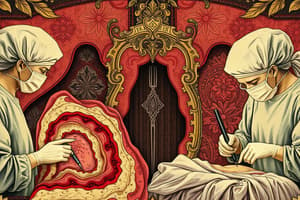Podcast
Questions and Answers
What type of wound is caused by a clean surface cut and may damage tendons or nerves?
What type of wound is caused by a clean surface cut and may damage tendons or nerves?
- Complex laceration
- Abrasion
- Puncture wound
- Simple laceration (correct)
What type of wound has a small entry site but a high risk of infection due to deep internal damage?
What type of wound has a small entry site but a high risk of infection due to deep internal damage?
- Stab wound
- Abrasion
- Contusion
- Puncture wound (correct)
What type of wound is caused by blunt blows and may indicate deeper damage such as a fracture or internal injury?
What type of wound is caused by blunt blows and may indicate deeper damage such as a fracture or internal injury?
- Stab wound
- Simple laceration
- Gunshot wound
- Contusion (correct)
Flashcards
Simple Laceration
Simple Laceration
A wound caused by a clean surface cut, potentially damaging tendons or nerves.
Puncture Wound
Puncture Wound
A wound with a small entry but high infection risk due to deep internal damage.
Contusion
Contusion
A wound caused by blunt force, possibly indicating deeper damage like fractures.
Study Notes
- Wounds can be classified based on the object and manner of infliction.
- Each type of wound carries specific risks of tissue damage and infection.
- Simple laceration is caused by a clean surface cut and may damage tendons or nerves.
- Complex laceration is caused by blunt or ripping forces and is often contaminated with germs.
- Puncture wounds have a small entry site but a high risk of infection due to deep internal damage.
- Abrasions are superficial wounds caused by a sliding fall or friction burn and may contain foreign particles.
- Stab wounds caused by a long or bladed instrument can be life-threatening due to the risk of vital organ injury and internal bleeding.
- Contusions are caused by blunt blows and may indicate deeper damage such as a fracture or internal injury.
- Gunshot wounds cause serious internal injury and infection due to contaminants from clothing and the air.
- It is important to note the number of wounds in a gunshot injury.
Studying That Suits You
Use AI to generate personalized quizzes and flashcards to suit your learning preferences.




